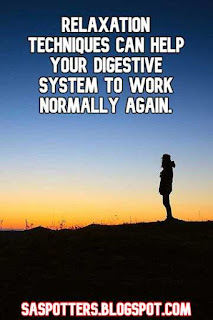 |
| Mental relaxation is healthy. |
Mental relaxation like yoga, aroma therapy and meditation is extremely good for your mental health.
It also has impressive benefits for your physical health. Today we examine how mental relaxation can improve your physical body.
 |
| Relax. It's good for you. |
Physical health benefits of mental relaxation
There are many benefits of relaxation. They include:1. Lowered blood pressure
2. Improved digestion
3. Maintenance of blood sugar
4. Improved blood flow to muscles and other tissues
5. Reduced muscle tension
6. Reduced chronic or prolonged pain
7. Better sleep quality
8. Higher energy levels and less fatigue
9. Less stress hormone activity
10. Lower heart rate
11. Slower breathing rate
 |
| Relaxation benefits almost everything. |
1. Relaxation lowers blood pressure
Relaxing activities like yoga, tai chi, music, sitting in the sun, meditation, and relaxing social activities can dilate your blood vessels lower your blood pressure almost instantly.Blood vessels dilate (expand) which helps blood to flow through them easier when you relax. This improves your body's ability to nourish itself all over.
The more often you relax, the easier it will be for your body to enter into a healthy state of relaxation. This is why doing relaxing activities or learning how to relax frequently can lower your overall blood pressure over time.
 |
| Blood pressure drops when you relax. |
2. Relaxation improves digestion
Stress causes digestive issues like stomach discomfort, bloating, constipation, diarrhea, frequent toilet visits, ulcers, and an unhealthy change in appetite. It can worsen irritable bowel syndrome as well.These issues may be acute (once off) in times of short-term stress, or chronic (doesn't go away) as a result of prolonged stress.
Mental relaxation helps to counteract the negative effects of stress on the digestive system.
This is why dome people need to go to the toilet or let out gas during relaxing activities like exercise - their digestive systems begin to return to a state normalcy as a result of the mental relaxation.
 |
| Share this image. |
3. Relaxation helps to lower blood sugar levels
Stress triggers a chain of biological responses in your body. This is okay if it is balanced out with periods of rest and relaxation. When you stress too much, certain processes are left to run rampant while other processes never get the biological attention that they deserve.
Your body is not going to focus on healing itself, for example, if it thinks that it needs to gear up for impending danger.
Blood pressure and heart rate increase. Your breathing rate increases and you are more likely to breathe through your mouth. Muscles tense up in preparation for a burst of physical activity.
Digestion is put on hold until the body detects a time of rest and recovery.
Blood sugar levels can get real high during the stressful state because your body reacts to the stressful situation by pouring energy into the blood stream. When this energy isn't used, it is out of place and then damages your health.
Relaxation signals to the body that it can shut off these processes and go into a state of rest and recovery. Blood sugar is taken out of the blood stream and shuttled back into storage to be used at a later stage.
 |
| Relax more to heal more. |
4. Relaxation improves blood flow to muscles and other tissues
When relaxation dilates blood vessels; blood circulation improves and blood flow increases. This helps with two very important things.
Firstly, important nutrients like oxygen, energy and proteins can reach muscles and other tissues. This gives them the building blocks that they need to rebuild and function properly.
Secondly, by-products and toxins like carbon dioxide and old cells can exit muscles and tissues to be recycled or disposed of.
 |
| You need rest to succeed. |
5. Relaxation reduces muscle tension
Stress indicates a danger that we need to escape from or a prey that we need to catch. Our minds and bodies work together in order to ensure our maximum chances of survival in these situations.Stress tenses muscle fibers in preparation for a burst of physical activity. When we stay in the stressful state for longer periods of time, tension gradually increases. Tension gets greater over time because every fresh moment of stress adds to existing tension.
Periods of relaxation signal to our brains (and therefore our bodies) that the dangerous situation has passed and that we can go back to normal.
When the signal to relax does not come after an extended period of time (or if it comes too infrequently to balance out stressful situations), tension build-up leads to things like muscle knots, aches and pains, restricted blood flow and bad postural development.
This is why exercise is so good for things like mental stress. It is clear to the mind and body that the period of danger has passed at the end of the workout. People who stress and don't exercise live in a constant biological state of danger anticipation.
The bodies of people who exercise live as though the dangerous situation is gone. Every stressful situation then starts with a relaxed and healed body instead of adding to existing tension.
Relaxation also tells the body that the dangerous situation is gone and that they can therefore start internal healing processes.
 |
| Relaxation is essential to health. |
6. Relaxation for pain
Studies show that relaxation reduces both chronic (persistent) and acute (once-off) pain.
Web MD explains that chronic stress is one of the factors that contribute to pain, and that relaxation exercises can help with natural pain relief as part of your pain management plan.
The pain response is very similar to the stress response. Heart rate, blood pressure, breathing rate and muscle tension all increase. Both pain and stress hit your nervous system hard. It is hard for the body to relax or to heal in this kind of state.
Web MD mentions studies that reveal that just thinking about a stressful event (or talking about it) causes a dramatic increase in back tension for patients with back pain.
Stress can increase the harshness of pain, while relaxation dulls its effects.
An elevated sense of well-being from relaxation helps people to cope with pain as well. It helps to mitigate the frustration that chronic pain tends to cause - the frustration that makes the pain worse to begin with.
Web MD explains that chronic stress is one of the factors that contribute to pain, and that relaxation exercises can help with natural pain relief as part of your pain management plan.
The pain response is very similar to the stress response. Heart rate, blood pressure, breathing rate and muscle tension all increase. Both pain and stress hit your nervous system hard. It is hard for the body to relax or to heal in this kind of state.
Web MD mentions studies that reveal that just thinking about a stressful event (or talking about it) causes a dramatic increase in back tension for patients with back pain.
Stress can increase the harshness of pain, while relaxation dulls its effects.
An elevated sense of well-being from relaxation helps people to cope with pain as well. It helps to mitigate the frustration that chronic pain tends to cause - the frustration that makes the pain worse to begin with.
 |
| Use relaxation for pain relief. |
7. Relaxation increases sleep quality
Most techniques that help you to sleep are techniques that help you to relax.
Our bodies go through periods of high energetic activity and restfulness. Hormones tell us when to be active and when to relax. We are supposed to relax before bed time in order to get the best amount of high quality sleep.
It is almost impossible to get good natural sleep without being in a state of relaxation. Regular relaxation activities will help you to fall into a state of relaxation that is conducive to good sleep much quicker.
Imagine being able to sleep as soon as you want to.
Relaxation will also improve the quality of your sleep. This means that every hour of sleep is much more valuable in terms of its restorative effect on physical and mental health.
The more relaxed you are when you fall asleep, the better you will feel when you wake up.
 |
| Relax to sleep better. |
8. Relaxation for higher energy levels
Relaxation can improve your energy levels.
The fact that relaxation improves blood pressure, digestion, blood sugar, blood circulation, muscle tension, pain, sleep, stress and breathing means that your body can heal itself.
You will be healthier and your body can finally heal from issues that it has been putting off because it was in a constant state of stress. Freedom from stress frees up precious energy that your body can use for other functions like healing and recovery.
There's only so much healing that you can do. Once you have received the healing that your body needs, energy levels will improve as you have more physical energy at your disposal.
 |
| Relax for energy. |
9. Less stress hormone activity
The stress hormone cortisol isn't a bad hormone. It has very important functions. It helps to turn nutrients into energy and gives you the motivation to get up and do different activities.
Cortisol becomes unhealthy when we have too much of it. This happens when we stress at a higher intensity than what we should. It also becomes unhealthy when it is elevated for extended periods of time.
Cortisol should rise sharply in the morning when we wake up to give us energy for the day. It should slowly taper off to reach its lowest point when we sleep.
Stress throughout the day triggers an up-regulation of cortisol so that it doesn't slowly taper off. This is why so many people struggle to fall asleep at night.
Exercise can modulate sleep patterns through many different mechanisms. One of them is the ability to push cortisol back into healthy levels.
Relaxation is a great countermeasure against stress. It can reduce cortisol by the same degree that stress increases it.
This will help you to keep your stress hormone (cortisol) levels in balance so that it serves you but doesn't burn you.
 |
| Use relaxation to reduce stress. |
10. Relaxation to lower heart rate
High blood pressure, high blood sugar, rapid breathing and a faster heart rate are all cardiovascular responses to stress that aren't bad for you if they come and go in the way that they are supposed to.
Stress triggers these conditions while relaxation does the opposite. These conditions become chronic when the presence of stress, in the absence of relaxation, causes an elevation without the opposing reduction.
This puts a lot of pressure on your cardiovascular system. Your heart shouldn't have to labor at a stressed rate all of the time. It needs periods of relaxation. The risk of various heart diseases (and other cardiovascular disease) increase without vital periods of relaxation and recovery.
Give yourself some much-needed relaxation time to balance out the physical effects of mental stress.
 |
| Give your heart a break. |
11. Slower breathing rate
A high-paced, stressed-out state of mind increases your heart rate and your breathing rate.Some physical bodily processes speed up (like heart rate and breathing) while others slow down (like digestion and healing) to help you survive in periods of stress.
Our bodies need to slow down in order for other bodily processes to become a priority. When you slow down mentally, your breathing rate and heart rate will slow down as well.
Blood pressure will drop and your body will experience a shift in energy.
Mood changes include a change in attitude, similar to enlightenment.
Digestion works better and the immune system can work in the way that it is supposed to.
Healing processes that have been put off can come back online to restore your body.
Many people use techniques to slow their breathing so that their bodies can enter into this healing, restorative state. Your breathing rate will slow down automatically when you relax.
 |
| Support our website and buy this awesome Fleece Blanket! |
No comments:
Post a Comment